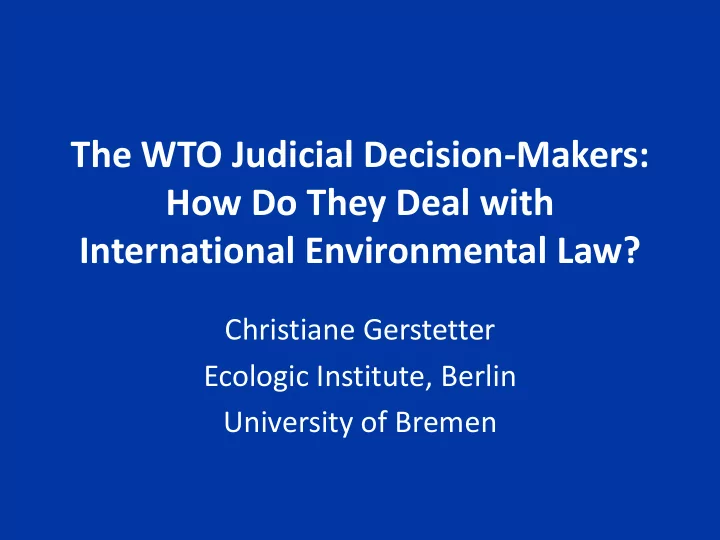

The WTO Judicial Decision-Makers: How Do They Deal with International Environmental Law? Christiane Gerstetter Ecologic Institute, Berlin University of Bremen
WTO dispute settlement • Two stage process : „ panels “ as first instance, „ Appellate Body“ as appeal body • Relatively „ judicialised “ body • More than 300 disputes initiated since 1995 • Rather effective enforcement
Are the WTO dispute settlement bodies actors that influence international environmental law (IEL)?
I Theory
Courts as (judicial) decison-makers • Law is indeterminate: lingustic indeterminacy, lacunae, collisions • How do courts deal with it? They are not pre- determined by law in all instances and thus have a certain element of discretion, but at the same time they cannot communicate the indeterminacy of law as a reason for their decisions.
Consequences for reading WTO dispute settlement decisions • Different substantive outcomes are often legally feasible . • Judicial style matters.
II Evidence from the dispute settlement
Shrimp – Turtles case • Import ban by the US on shrimp from countries where shrimp is harvested with devices that harm sea turtles • MEAs used to interpret terms of WTO law. • Existence of regional environmental agreement used as factual evidence for finding of discrimination. • No direct finding on relationship between CITES and WTO law. • Result: US import ban incompatible with WTO law
GMO case • Complaint against EC de-facto moratorium on approval of GMOs as well as member states safeguard measures • Panel avoids finding on status of precautionary principle in international law • Panel avoids finding on relevance of Biosafety Protocol • Result: EC measures not compatible with WTO law
Style • Very strong demonstrated commitment to the text • Very long decisions • Making methods of interpretation very explicit • Positioning WTO law as part of public international law • Very rarely relying on normative, policy- oriented arguments – only to show their own „ prudency “
Understanding the style All stylistic features used by the WTO dispute settlement bodies seem to aim at generating legitimacy and at signalling that WTO does not over-step its competences – either vis-à-vis legislators or international environmental law.
WTO dispute settlement – an actor influencing IEL? • WTO dispute settlement bodies avoid findings that directly modify IEL. • WTO dispute settlement bodies avoid any apperance of influencing IEL. • However, likely indirect influence, because political measures must be made compatible with WTO law, as interpreted by dispute settlement.
Thank you. christiane.gerstetter@ecologic.eu
Recommend
More recommend